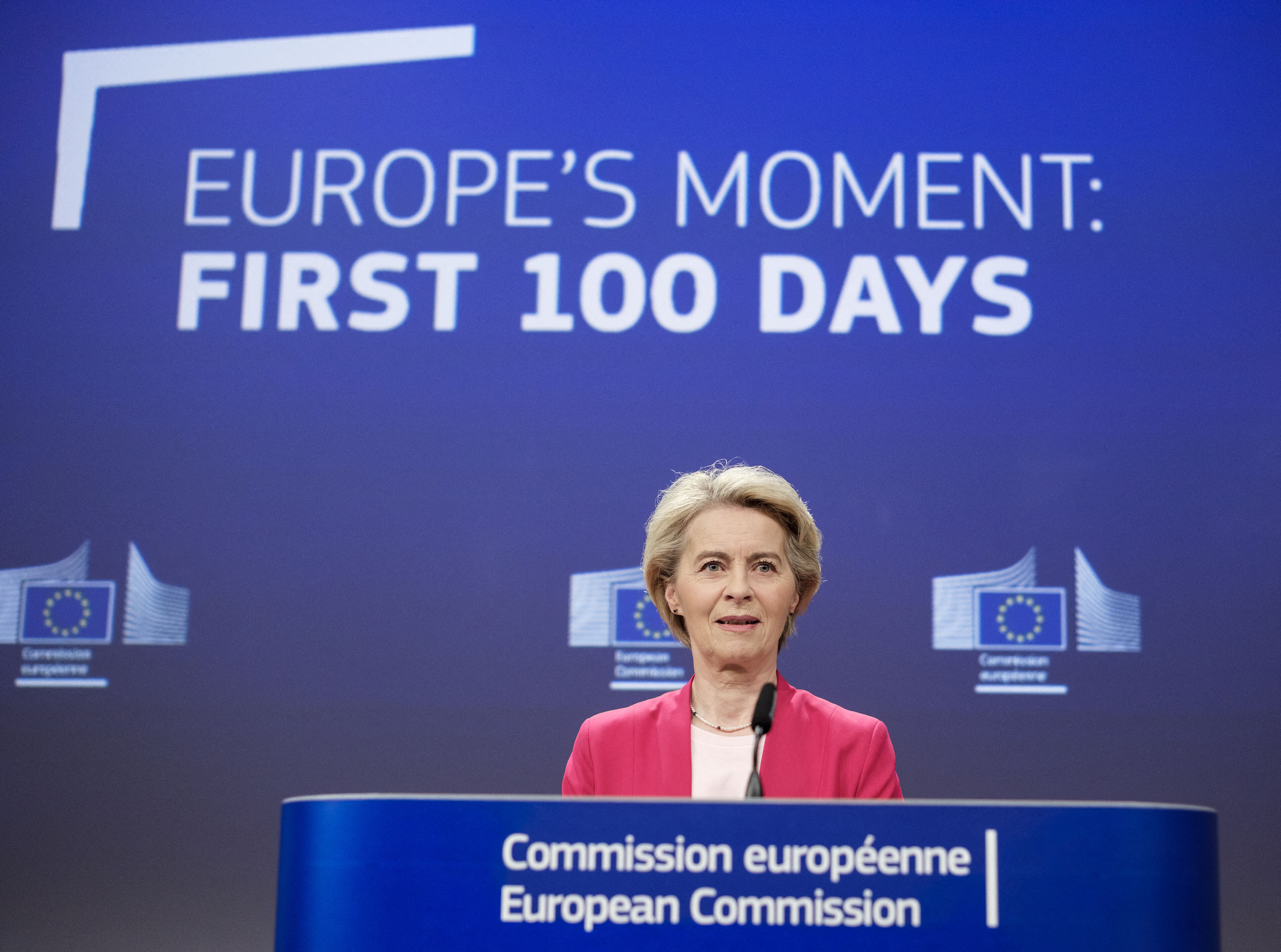Europe
European Commission: The First 100 (Stormy) Days

Ursula von der Leyen am 9. März 2025 im Berlaymont
© picture alliance / abaca | Monasse Thierry/ANDBZ/ABACAUrsula von der Leyen certainly has her work cut out for her. Many of the challenges that marked her first term as President of the European Commission are spilling over into her second five-year term. With the Israel-Hamas war in Gaza, the US-China rivalry, and Russia's war in Ukraine still ongoing, Donald Trump's return to the White House increases the pressure on the European Union (EU) to show leadership.
As for challenges within the EU, the new European Commission will have to deal with a resurgence of nationalism in some member states, as well as populist forces pushing for protectionism and the erosion of democratic values. Add to that unresolved migration issues, ailing industries and concerns about Europe's energy security. As if that weren't enough, the Commission must also ensure that no one is left behind in the green transition and digital transformation.
The distribution of portfolios in Ursula von der Leyen’s second College can be seen as an attempt to address these challenges holistically, with all-encompassing titles and shared responsibilities, but also as a way to prevent anyone from rising too high from the ranks, ultimately keeping the real power in the hands of the Commission President. Compared to von der Leyen’s first term (2019-2024), the new Commission introduces significant structural changes, including the creation of a Defence Commissioner role, the merging of climate and competition policies, and the appointment of a dedicated Industrial Strategy and Prosperity portfolio, clearly reflecting its priorities for the upcoming years: defence and security, sustainable prosperity and competitiveness, democracy and social fairness.
In her political guidelines for 2024-2029, von der Leyen also set clear goals for the first 100 days of her term. These include a new Clean Industrial Deal, a European action plan on the cybersecurity of hospitals and healthcare providers, an AI Factories initiative, a White Paper on the Future of European Defence (pending), Youth Policy Dialogues, a Vision for Agriculture and Food and the Commission‘s pre-enlargement policy reviews (pending).
In general, most of the Commission‘s objectives have been met. The White Paper on the Future of European Defence will be presented on March 19, outlining further investment needs and possibilities to bolster European defence. Taking into account the continuous Russian shelling of civilian targets across Ukraine and the Trump administration’s sharp turn away from Kyiv and toward Moscow, the longevity of the paper is questionable anyway. In defence matters, Europe is now forced to act on an ad hoc basis due to the serious failures of previous years, although the recent major EU defence spending initiative “ReArm Europe” shows that the urgency of the matter has been recognized.
When it comes to the enlargement of the European Union, the pace of the accession process leaves much to be desired. The Union remains divided over concerns about economic burdens and governance standards, while recognizing that enlargement is an absolute geopolitical imperative for the EU and a litmus test of its long-term ambitions as a global power.
A lot has happened with regard to Europe's economy: Since taking office on 1 December the Commission also presented the Competitiveness Compass, adopted the Union of Skills, accompanied by an Action Plan on Basic Skills and a STEM Education Strategic Plan, and presented the Action Plan for the European Automotive Sector. Some of the initiatives presented, such as the Clean Industrial Deal, rely too much on subsidies and other state economic emergency instruments rather than on the market economy. Moreover, the effectiveness of the European Commission in producing new initiatives does not necessarily translate into the effectiveness of the European Union as a whole. Simplification should be the driving thought behind every new proposal coming from the European Commission aimed at boosting the EU's competitiveness.
At the international level, Ursula von der Leyen succeeded at the beginning of her second term in reaching political agreement on a groundbreaking partnership with the Mercosur countries after almost 25 years of negotiations, in reaching political agreement on a modernized partnership between the EU and Switzerland, and in concluding a modernized trade agreement with Mexico.
Von der Leyen's leadership in this term is more security-focused, with an emphasis on defence, industrial policy, and economic competitiveness. The Commission's initiatives to lower energy prices, mobilize private investment, and foster international partnerships are correct. The implementation of the recently approved €800 billion defence plan, its ability to address economic headwinds, including sluggish growth and competitiveness, and ensuring investment in sustainable technologies and infrastructure - all accompanied by significant deregulation - will be the next criteria by which her Commission's performance will be judged.
Most of von der Leyen's goals for the first 100 days have been achieved, but they are only the starting point of actual achievements. They are a first step towards legislation, proposals, discussion papers, strategic outlooks and dialog formats. Their success will be measured by their implementation and impact.
